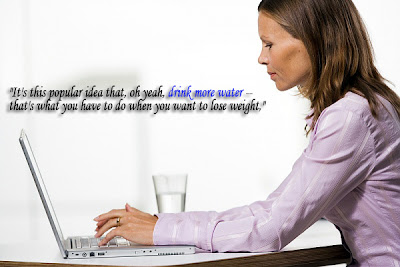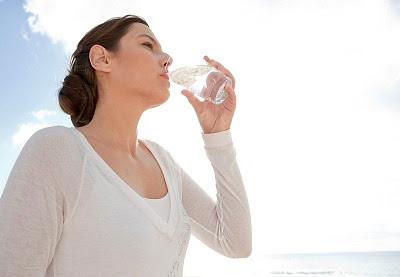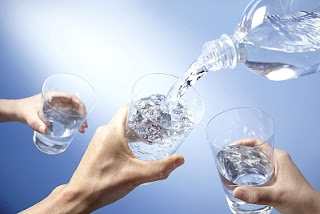Water And Weight Loss
The apparent weight loss effects of water are still a subject for further research, but there is some evidence that suggests that drinking water can be associated with appetite reduction (for middle-aged and older people), consuming fewer calories, burning slightly more calories,and eating more fruits and vegetables. Increased water consumption, or replacement of energy-containing beverages with energy-free beverages, or consumption of water-rich foods such as fruits and vegetables with a lower energy density, may help in weight management. Popular advice to children regarding water consumption is often inaccurate.
 |
| Drinking Water And Weight Loss |
Drinking two 8-ounce glasses of water before breakfast, lunch, and dinner while also cutting back on portions may help you lose weight and keep it off for at least a year, according to research presented today at the annual meeting of the American Chemical Society, in Boston.
 |
| Water Weight Loss |
"As part of a prudent, low-calorie weight-loss diet, adding water may help with weight-loss success," says Brenda Davy, Ph.D., the lead author of the study and an associate professor of nutrition at Virginia Tech, in Blacksburg.
It's so simple...drink water! 6-8 large glasses a day.
How do you know if you are not getting enough water each day? This is a really important question because so many of us have deprived ourselves of water for years that we have become accustomed to doing without the full amount of water our body requires and we don't recognize the symptoms of thirst.
 |
| Water And Weight Loss |
- The most common symptom is headaches. A major function of water is to flush toxins from the body. Your brain is 75% water, so even being slightly dehydrated can cause headaches.
- Poor concentration/fatigue. If you body can't get rid of the toxins it will struggle and you will feel less energetic as your body diverts energy to deal with the toxins.
- Constipation. Your body will divert water to more essential functions and as a result your stools will be harder and more difficult to expel.
- Reduced urine output or dark urine. Did you know that up to 200 litres of water is passed through your kidneys daily? Without a fresh supply of water for the kidneys to filter waste products out of the blood, your urine will become darker.
- Furry tongue or bad breath. If you don't have enough water passing through the mouth to wash away food particles, bacteria can proliferate and result in that 'furry' feeling or bad breath.
- Skin. Your skin should feel elastic. When you pinch the skin on the back of your hand it should snap back instantly.
"This is an easy way to replace those calories, and if everything is equal, it will slow down your weight gain or reverse it,"
 |
| Water And Weight Loss |
Drinking two cups of water before all three meals helped dieters lose weight and keep it off.
The findings only worked in people who were middle-aged and older, but water might help younger dieters, too.
 |
| Water And Weight Loss |
Some claim that drinking cold water aids in calorie burn as the body has to work to heat the cold water in the body and hence burning calories. This idea may be similar to the idea of eating Celery as a Negative calorie food. However the number of calories generated by drinking cold water may be minimal, since the body's response to cold conditions is to first reduce heat loss, not create new heat. It does this mainly by reducing blood flow to the skin, which reduces heat lost through the skin.
 |
| Water And Weight Loss |
If this isn't sufficient to maintain body temperature, new heat is created through shivering. A study found that drinking that approximately 518 mL (18 ounces) of near-freezing water (3°C) only burned approximately 4 kcal, well below the theoretical energy cost of warming the water to body temperature.












No comments:
Post a Comment